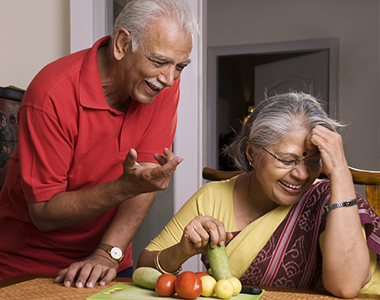You’re not alone
If you’ve been diagnosed with Type 2 diabetes, don’t worry, you’re not alone.
Worldwide, 344 million adults have Type 2 Diabetes1.
Type 2 diabetes occurs when the pancreas isn’t producing enough insulin, or the insulin produced isn’t effective. Although its key causes are unclear, lifestyle and family history appear to be contributing factors. Nearly 90% of all cases of diabetes are Type 22, and most situations can be managed by regular physical activity and healthy eating. However, as it is often progressive, most people will need oral medications and/or insulin injections in addition to these lifestyle changes. And while it was once called adult onset diabetes, children and teenagers can develop Type 2 diabetes as well3.

Risk Factors
There are several factors that can increase the risk of developing Type 2 diabetes.
They include family history, ethnicity, weight, inactivity, age, pre-diabetes (a condition in which your blood sugar is higher than normal) and gestational diabetes (diabetes that develops during pregnancy)3.

Symptoms and diagnosis
Some of the symptoms of Type 2 diabetes can seem harmless at first - you can even have the disease without knowing it. Symptoms of hyperglycaemia (high blood sugar) might include3:
- Increased thirst and frequent urination
- Extreme hunger
- Fatigue
- Blurred vision
- Headaches or dizziness
Other problems may occur at a later stage, including a slower healing process or tingling and numbness in the hands or feet. Some men with Type 2 diabetes may also experience erectile dysfunction.4
Usually, your doctor will test you for diabetes by taking a blood sample and sending it to a laboratory, or by using a glucose meter. This will measure your blood’s glucose levels to determine if they’re too high, indicating diabetes.
Specifically, you are more likely to develop Type 2 diabetes if you:
- Have a family history of diabetes5
- Have had gestational diabetes5
- Are overweight or obese5
- Are inactive5
- Are of South Asian, African-Caribbean, Black African, Aboriginal or Torres Strait islander ethnicity6,7
- Are over 406
Additionally, you are at risk if you:
- Drink alcohol excessively 7
- Have high blood pressure4 or have had a heart attack or stroke6,7
- Have polycystic ovary syndrome (PCOS) and are overweight6
- Are taking certain antipsychotic medications6
- Have impaired glucose tolerance5
You may be interested in
TREATMENT OPTIONS FOR T2 DIABETES
Consider treatment options for T2 diabetes to find the best fit for you.
More DetailsIS INSULIN PUMP THERAPY RIGHT FOR T2 DIABETES?
Consider whether insulin pump therapy is right for you.
More Details- IDF Diabetes Atlas, 2013
- Diabetes Australia "Diabetes in Australia" https://www.diabetesaustralia.com.au/diabetes-in-australia
- Diabetes Australia "Type 2 Diabetes" https://www.diabetesaustralia.com.au/type-2-diabetes
- Maiorino, M. I., Bellastella, G., & Esposito, K. (2014). Diabetes and sexual dysfunction: current perspectives. Diabetes, Metabolic Syndrome and Obesity: Targets and Therapy, 7, 95–105. http://doi.org/10.2147/DMSO.S36455
- International Diabetes Federation “Risk Factors“ http://www.idf.org/about-diabetes/risk-factors
- Diabetes UK “Diabetes Risk Factors” https://www.diabetes.org.uk/Preventing-Type-2-diabetes/Diabetes-risk-factors/
- BUPA “Type 2 Diabetes” http://www.bupa.com.au/health-and-wellness/health-information/az-health-information/type-2-diabetes





